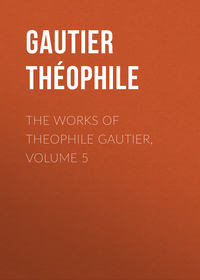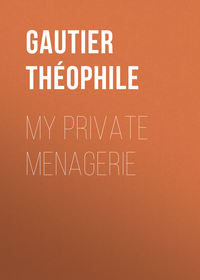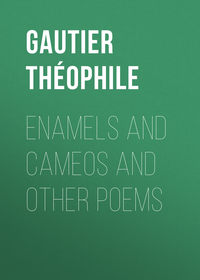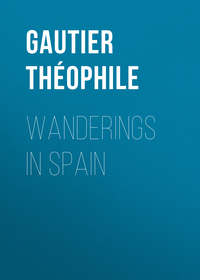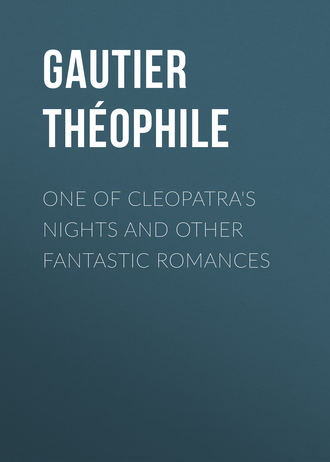 полная версия
полная версияOne of Cleopatra's Nights and Other Fantastic Romances
"What, you have Falernian wine, animal! And put it at the end of your list! And you dare to subject us to an unendurable œnological litany!" cried Max, leaping at the inn-keeper's throat with burlesque fury. "Why, you have no sentiment of local color. You are unworthy to live in this antique neighborhood. Is it even good, this Falernian wine of yours? Was it put in amphoræ under the Consul Plancus —Consule Planco?"
"I know nothing about the Consul Plancus, and my wine is not put in amphoræ, but it is good, and worth ten carlins a bottle," answered the inn-keeper.
Day had faded away and the night came, a serene, transparent night, clearer, assuredly, than full midday in London. The earth had tints of azure, and the sky silvery reflections of inconceivable sweetness. The air was so still that the flames of the candles on the table did not oscillate.
A young boy, playing a flute, approached the table, and standing there, with his eyes fixed upon the three guests, performed upon his sweet and melodious instrument, one of those popular airs in a minor key which have a penetrating charm.
Perhaps that lad was a direct descendant of the flute-player who marched before Duilius.
"Our repast is assuming quite an antique aspect. We only need some Gaditanian dancing women and ivy garlands," exclaimed Max, as he helped himself to a great bumper of Falernian wine.
"I feel myself in the humor for making Latin quotations like a feuilleton in the Débats. Stanzas of odes come back to my memory," added Max.
"Keep them to yourself!" cried Fabio and Octavian, justly alarmed. "Nothing is so indigestible as Latin at dinner."
Among young men with cigars in their mouths and elbows on the table, who find themselves contemplating a certain number of empty flagons, especially when the wine has been capitally good, conversation never fails to turn upon women. Each explained his own system, whereof the following is a fair summary:
Fabio cared only for youth and beauty. Voluptuous and positive, he found no pleasure in illusions, and had no preferences in love. A peasant girl would have pleased his fancy as well as a princess, provided she were beautiful. The body rather than its apparel attracted him. He laughed much at certain of his friends who were enamored of so many yards of lace and silk, and he declared it were more rational to fall in love with the stock of a fashionable marchand des nouveautés. These opinions, which were rational enough in the main, and which he made no attempt to conceal, caused him to pass for an eccentric.
Max, less of an artist than Fabio, cared only for difficult undertakings, complicated intrigues. He sought resistances to vanquish, virtues to seduce, and played at love as at a game of chess, with long-premeditated moves, reserved ambuscades, and stratagems worthy of Polybius. In a drawing-room he would always choose the woman who seemed least in sympathy with him for the object of attack. To make her pass by skilful transition from aversion to love afforded him delicious pleasure. To impose himself upon characters which strove to repel him, and master wills that rebelled against his influence, seemed to him the sweetest of all triumphs. Like those hunters who, through rain, sunshine, or snow, through fields and woods, and over plains, pursue with excessive fatigue and unconquerable ardor some miserable quarry which in three cases out of four they would not deign to eat, so Max, having once captured his prey, troubled himself no further about it, and at once started off on another chase.
As for Octavian, he confessed that reality itself had little charm for him, not because he indulged in student-dreams, all moulded of lilies and roses like one of Demoustier's madrigals, but because there were too many prosaic and repulsive details surrounding all beauty, too many doting and decorated fathers, coquettish mothers who wore natural flowers in false hair, ruddy-faced cousins meditating proposals, ridiculous aunts in love with little dogs. An acquatinta engraving after Horace Vernet or Delaroche, hung up in a woman's room, would have been sufficient to check a growing passion within him. More poetical even than amorous, he wanted a terrace on Isola-Bella, in Lake Maggiore, under the light of a full moon to frame a rendezvous. He would have wished to elevate his love above the midst of common life, and transport its scenes to the stars. Thus he had by turns fallen fruitlessly and madly in love with all the grand feminine types preserved by history or art. Like Faust, he had loved Helen, and would have wished that the undulations of the ages might bear to him one of those sublime personifications of human desires and dreams, whose forms, to mortal eyes invisible, live immortally beyond Space and Time. He had created for himself an ideal seraglio, with Semiramis, Aspasia, Cleopatra, Diana of Poitiers, Jane of Arragon. At times also he had fallen in love with statues, and one day, passing before the Venus of Milo in the Museum, he cried out passionately: "Oh, who will restore thy arms that thou may'st crush me upon thy marble bosom!" At Rome, the sight of a matted mass of long thick human hair, exhumed from an antique tomb, had thrown him into a fantastic delirium. He had attempted, through the medium of a few of those hairs, obtained by a golden bribe from the custodian, and placed in the hands of a clairvoyant of great power, to evoke the shade and form of the dead; but the conducting fluid – the subtle odyle – had evaporated during the lapse of so many years, and the apparition could no more come forth out of the eternal night.
As Fabio had divined before the glass cabinet in the Studii Museum, the imprint discovered in the cellar at the villa of Arrius Diomedes had excited in Octavian wild impulses toward a retrospective ideal. He longed to soar beyond Life and Time and transport himself in spirit to the age of Titus.
Max and Fabio retired to their room, and being somewhat heavy-headed from the classic fumes of the Falernian, were soon sound asleep. Octavian, who had more than once suffered the full glass to remain before him untasted, not wishing to disturb by a grosser intoxication the poetic drunkenness which boiled in his brain, felt from the agitation of his nerves that sleep would not come to him, and left the hostelry on tiptoe that he might cool his brow and calm his thoughts in the night air.
His feet bore him unawares to the entrance which leads into the dead city. He removed the wooden bar that closed it, and wandered into the ruins beyond.
The moon illuminated the pale houses with her white beams, dividing the streets into double-edged lines of silvery white and bluish shadow. This nocturnal day, with its subdued tints, disguised the degradation of the buildings. The mutilated columns, the façades streaked with fugitive lizards, the roofs crumbled in by the eruption, were less noticeable than when beheld under the clear, raw light of the sun. The lost parts were completed by the half-tint of shadow, and here and there one brusque beam of light, like a touch of sentiment in a picture-sketch, marked where a whole edifice had crumbled away. The silent genii of the night seemed to have repaired the fossil city for some representation of fantastic life.
At times Octavian fancied that he saw vague human forms in the shadow, but they vanished the moment they approached the edge of the lighted portion of the street. A low whispering, an indefinite hum, floated through the silence. Our promenader at first attributed them to a fluttering in his eyes, to a buzzing in his ears; it might even, he thought, be merely an optical delusion, coupled with the sighing of the sea-breezes, or the flight of some snake or lizard through the nettles, for in nature all things live, even death; all things make themselves heard, even silence. Nevertheless he felt a kind of involuntary terror, a slight trembling, that might have been caused by the cold night air, but which made his flesh creep. Could it be that his comrades, actuated by the same impulses as himself, were seeking him among the ruins? Those dimly seen forms and those indistinct sounds of footsteps! Might it not have been only Max and Fabio walking and chatting together, who had just disappeared round the corner of a cross-road? But Octavian felt to his dismay that this very natural explanation could not be true, and the arguments which he made to himself in favor of it were the reverse of convincing. The solitude and the shadow were peopled with invisible beings whom he was disturbing. He had fallen into the midst of a mystery, and it seemed that they were awaiting his departure in order to commence again. Such were the extravagant ideas that floated through his brain, and obtained no little verisimilitude from the hour, the place, and the thousand alarming details which those can well understand who have ever found themselves alone by night in the midst of some vast ruin.
Passing before a house which he had attentively observed during the day, and which the moon shone fully upon, he beheld in perfect integrity a certain portico whereof he had vainly attempted to restore the design in fancy. Four Ionic columns – fluted for half their height and their shafts purple-robed with minium tints – sustained a cymatium adorned with polychromatic ornaments that the artist seemed only to have completed the day before. Upon one side wall of the entrance a Laconian molossus, painted in encaustic, and accompanied by the warning inscription "Cave canem" barked at the moon and the visitor with pictured fury. On the mosaic threshold the word HAVE, in Oscan and Latin characters, saluted the guest with its friendly syllables. The outer surfaces of the walls, tinted with ochre and rubric, were unmarred by a single crack. The house had grown a story higher; and the tiled roof, now surmounted by a bronze acroterium, projected an intact outline against the light blue of the sky, where a few stars were growing pale.
This strange restoration effected between afternoon and evening by some unknown architect greatly puzzled Octavian, who felt certain of having the same day seen that very house in a lamentable state of ruin. The mysterious reconstructor had labored with great despatch, for all the neighboring dwellings had the same fresh, new look; all the pillars were coiffed with their capitals; not a single stone, a brick, a pellicle of stucco or a scale of paint was wanting upon the shining surfaces of the façades; and through the intervals of the peristyles surrounding the marble basin of the cavædium one could catch glimpses of white laurels and bayroses, myrtles and pomegranates. Surely all the historians were mistaken; the eruption had never taken place, or else the needle of Time had moved backward twenty secular hours upon the dial of Eternity!
In the climax of his astonishment, Octavian commenced to wonder whether he might not actually be sleeping upon his feet, and walking in a dream. He even seriously asked himself whether madness might not be parading its hallucinations before his eyes; but he soon felt himself compelled to admit that he was neither asleep nor mad.
A singular change had taken place in the atmosphere. Vague rose-tints were blending through brightening shades of violet with the faintly azure tints of moonlight; the sky commenced to glow brightly along its borders; daylight seemed about to dawn. Octavian took out his watch: it marked the hour of midnight. Fearing that it might have stopped, he pressed the spring of the repeating mechanism. It struck twelve times. It was midnight beyond a doubt, and yet the brightness ever increased. The moon sank through the azure which became momentarily more and more luminous. The sun rose!
Then Octavian, to whom all ideas of time had become hopelessly confused, was able to convince himself that he was walking, not through a dead Pompeii, the chill corpse of a city half-shrouded, but through a living, youthful, intact Pompeii over which the torrents of burning mud from Vesuvius had never flowed.
An inconceivable prodigy had transported him, a Frenchman of the nineteenth century, back to the age of Titus, not in spirit only, but in reality; or else had called up before him from the depths of the past a desolated city with its vanished inhabitants, for a man clothed in the antique fashion had just passed out of a neighboring house.
This man wore his hair short, and his face was closely shaven; he was dressed in a brown tunic and a grayish mantle, the ends of which were well tucked up so as not to impede his movements. He walked at a rapid gait, bordering upon a run, and passed by Octavian without perceiving him. He carried on his arm a basket made of Spanish broom, and proceeded toward the Forum Nundinarium. He was evidently a slave, some Davus, going to market beyond a doubt.
The noise of wheels became audible, and an antique wagon, drawn by white oxen and loaded with vegetables, came along the street. Beside the team walked a peasant – with legs bare and sunburnt, and feet sandal-shod – who was clad in a sort of canvas shirt puffed out about the waist; a conical straw hat hanging at his shoulders, and depending from his neck by the chin-band, left his face exposed to view – a type of face unknown in these days – a forehead low and traversed by salient, knotty lines, hair black and curly, eyes tranquil as those of his oxen, and a neck like that of the rustic Hercules. As he gravely pricked his animals with the goad, his statuesque attitudes would have thrown Ingres into ecstasy.
The peasant perceived Octavian and appeared surprised, but he proceeded on his way without being able, doubtless, to find any explanation for the appearance of this strange-looking personage, and in his rustic simplicity willingly leaving the solution of the enigma to those wiser than himself.
Campanian peasants also appeared on the scene, driving before them asses laden with skins of wine, and ringing their brazen bells. Their physiognomies differed from those of the modern peasants as a medallion differs from a son.
Gradually the city became peopled, like one of those panoramic pictures at first desolate, but which by a sudden change of light become animated with personages previously invisible.
Octavian's feelings had undergone a change. Only a short time before, amid the deceitful shadows of the night, he had fallen a prey to that uneasiness from which the bravest are not exempt amid such disquieting and fantastic surroundings as reason cannot explain. His vague terror had ultimately yielded to a profound stupefaction. The distinctness of his perceptions forbade him to doubt the testimony of his senses, yet what he beheld seemed altogether contrary to reason. Feeling still but half convinced, he sought by the authentication of minor actual details to assure himself that he was not the victim of hallucination. Those figures which passed before his eyes could not be phantoms, for the living sun shone upon them with unmistakable reality, and their shadows, elongated in the morning light, fell upon the pavement and the walls.
Without the faintest understanding of what had befallen him, Octavian, ravished with delight to find one of his most cherished dreams realized, no longer attempted to resist the fate of his adventure. He abandoned himself to the mystery of these marvels without any further attempt to explain them; he averred to himself that since he had been permitted, by virtue of some mysterious power, to live for a few hours in a vanished age, he would not waste time in efforts to solve an incomprehensible problem, and he proceeded fearlessly gazing to right and left upon this scene at once so old and yet so new to him. But to what epoch of Pompeiian life had he been transported? An ædile inscription engraved upon a wall showed him by the names of public personages there recorded, that it was about the commencement of the reign of Titus, or in the year 79 of our own era. A sudden thought flashed across Octavian's mind. The woman whose mould he had seen in the museum at Naples must be living, inasmuch as the eruption of Vesuvius by which she had perished took place on the 24th of August in this very year: he might therefore discover her, behold her, speak to her!.. The mad longing which had seized him at the sight of that mass of cinders moulded upon a divinely perfect form, was perhaps about to be fully satisfied, for surely naught could be impossible to a love which had had the strength to make Time itself recoil, and the same hour to pass twice through the sand-glass of Eternity!
While Octavian was abandoning himself to these reflections, beautiful young girls were passing by on their way to the fountains, all balancing urns upon their heads with their white finger-tips, and patricians clad in white togas bordered with purple bands were proceeding toward the Forum, each followed by an escort of clients. The buyers commenced to throng about the booths, which were all designated by sculptured or pictured signs, and recalled by reason of their shape and small dimensions the moresque booths of Algiers. Over most of them a glorious phallus of baked and painted clay, together with the inscription, Hic habitat Felicitas, testified to superstitious precautions against the evil eye. Octavian also noticed an amulet shop, whose shelves were stocked with horns, bifurcated branches of coral, and little figures of Priapus in gold, like those worn in Naples even at this day as a safeguard against the jettatura, and he thought to himself that a superstition often outlives a religion.
Following the sidewalk which borders each street in Pompeii (and deprives the English of all claim to this invention), Octavian suddenly found himself face to face with a beautiful young man of about his own age, clad in a saffron-colored tunic, and a mantle of snowy linen as supple as cashmere. The sight of Octavian in his frightful modern hat, girthed about with a scanty black frock-coat, his legs confined in pantaloons, and his feet cramped in well-polished boots, seemed to surprise the young Pompeiian in much the same way as one of us would feel astonished to meet on the Boulevard de Gand some Iowa Indian or native of Butocudo, bedecked with his feathers, necklace of bear's-claws, or whimsical tattooing. Nevertheless, being a well-bred young man, he did not burst out laughing in Octavian's face, and pitying the poor barbarian who had lost his way, no doubt, in that Græco-Roman city, he said to him in a soft, clear voice: "Advena, salve!"
Nothing could be more natural than that an inhabitant of Pompeii, in the reign of the divine, most powerful, and most august Emperor Titus, should speak Latin, yet Octavian started at hearing this dead tongue in a living mouth. It was then, indeed, that he congratulated himself on having been proficient in his college studies, and taken the honors at the annual examinations. The Latin taught him by the University served him in good stead on that unique occasion, and calling back to mind some souvenirs of his college course, he returned the salutation of the Pompeiian after the style of De viris illustribus and Selectæ e profanis, in a tolerably intelligible manner, but with a Parisian accent which forced the young man to smile despite himself.
"Perhaps it will be easier for you to converse in Greek," said the Pompeiian. "I am also acquainted with that language, for I studied at Athens."
"I am even less familiar with Greek than with Latin," replied Octavian. "I am from the land of Gaul – from Paris – from Lutetia."
"I know that country. My grandfather served under the great Julius Cæsar in the Gallic wars. But what a strange dress you wear! The Gauls whom I saw at Rome were not thus attired."
Octavian attempted to explain to the young Pompeiian that twenty centuries had rolled by since the conquest of Gaul by Julius Cæsar, and that the fashions had changed; but he forgot his Latin, and indeed, to tell the truth, he had but little to forget.
"My name is Rufus Holconius, and my house is at your service," said the young man, "unless, indeed, you prefer the freedom of the tavern. It is hard by the public-house of Albinus, near the gate of the suburb of Augustus Felix and the Inn of Sarinus, son of Publius, just at the second turn; but if you wish, I will be your guide through this city, in which you do not seem to be acquainted. Young barbarian, I like you, although you endeavored to impose upon my credulity by pretending that the Emperor Titus, who now reigns, died two thousand years ago, and that the Nazarean (whose infamous followers were plastered with pitch and burned to illuminate Nero's gardens) rules sole master of the deserted heavens whence the great gods have fallen! By Pollux!" he continued as his eyes fell upon a rubric inscription at a street-corner, "you have just come in good time. The Casina of Plautus, which has quite recently been put upon the stage, will be played to-day. It is a curious and laughable comedy which will amuse you, even if you only comprehend the pantomime of it. Come with me. It is nearly time for the play already. I will find you a place in the seat set apart for guests and strangers." And Rufus Holconius led the way toward the little comic theatre which the three friends had visited during the day.
The Frenchman and the citizen of Pompeii proceeded along the Street of the Fountains of Abundance and the Street of the Theatres, passing by the College, the Temple of Isis, and the Studio of the Sculptor, and entered the Odeon or Comic Theatre by a lateral vomitory. Through the recommendations of Holconius, Octavian obtained a seat near the proscenium in a part of the theatre corresponding to our private boxes which front upon the stage. All eyes were immediately turned upon him with good-natured curiosity, and a low whispering arose all through the amphitheatre.
The play had not yet commenced, and Octavian profited by the interval to examine the building. The semicircular seats, terminated at either end by a magnificent lion's paw sculptured in Vesuvian lava, receded, broadening as they rose, from an empty space corresponding to our parterre, but much narrower and paved in mosaic with Greek marble. The rows of seats widened above one another in regular gradation according to distance, and four stairways, corresponding with the vomitories, and sloping from the base to the summit of the amphitheatre, divided it into five cunei or wedge-shaped compartments, with the broad end uppermost. The spectators, all furnished with tickets consisting of little slips of ivory, upon which were indicated in numerical order the row, division, and seat, together with the name of the play and its author, took their places without confusion. The magistrates, nobility, married men, young folks, and the soldiers – who attracted attention by the gleaming of their bronze helmets – all occupied different rows of seats.
It was an admirable spectacle. Those beautiful togas and great white mantles displayed in the first row of seats, contrasting with the vari-colored garments of the women seated in the circle above, and the gray capes of the populace who were assigned to the upper benches near the columns which supported the roof, and between which were visible glimpses of a sky intensely blue as the azure background of the Panathenæa.
A fine spray aromatized with saffron fell from the friezes above in imperceptible mist, at once cooling and purifying the air. Octavian thought of the fetid emanations which vitiate the atmosphere of our modern theatres – theatres so uncomfortable that they may justly be considered places of torture rather than places of amusement, and he found that modern civilization had not, after all, made much progress.
The curtain, sustained by a transverse beam, sank into the depths of the orchestra; the musicians took their seats, and the Prologue appeared in grotesque attire, his face concealed by a frightful mask which fitted the head like a helmet.
Having saluted the audience and demanded applause, the Prologue commenced a merry argumentation. Old plays, he said, were like old wine which improves with age; and Casina, so dear to the old, should not be less so to the young: all could take pleasure in it, some because they were familiar with it, others because they were not. Moreover, the play had been carefully remounted, and should be heard with a cheerful mind, without thinking about one's debts or one's creditors, for people were not liable to be arrested at the theatre. It was a happy day, the weather was fair, and the halcyons hovered over the Forum.




